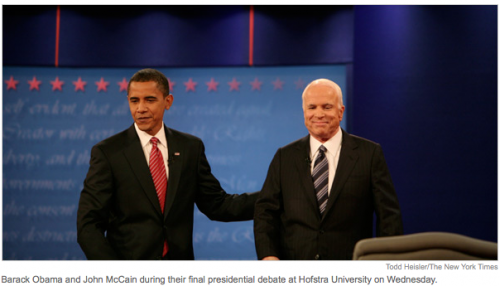The commons is an unfamiliar concept to most Americans, and one not likely to become a campaign issue in the closing week of the election. But it’s an underlying current of the presidential race that helps define the sharp differences between Republican and Democratic tickets this year.
John McCain is a devout believer in individualism, which is why he celebrates free market policies and go-it-alone foreign policy—just like the Bush Administration before him. Barack Obama represents a swing back to community minded values, which fit into the broader framework of the commons.

This election, more than any in recent history, offers a no-turning-back choice for what Americans want our country to become.
John McCain speaks patriotically of Country First and has recently taken to railing about the need for reform in Wall Street and Washington, but the policies he proposes will elevate selfishness to levels not seen since the days of Robber Barons. His tax plans push beyond even the Bush Administration in relieving wealthy people and corporations of any obligation to the greater common good. McCain’s assessment of our economic predicament assumes that government regulation is always the problem, and unfettered markets are always the solution. Never mind the Nightmare on Wall Street.
His views on military and foreign policy—the bedrock of his candidacy— isolates America as a solitary force battling terrorism, Russia and other perceived threats with little support or even discussion with anyone else in the world. He finds it laughable that Barack Obama would even consider sitting down to talk with those labeled as “enemies”.
McCain’s embrace of extreme individualism is best witnessed by his selection of Sarah Palin as a running mate—there could be no better symbol for this philosophy than the outspoken governor of our most outspokenly individualistic state (even though Alaska leads the country in receiving federal tax money per capita).
Barack Obama, while certainly no leftist, offers a quite different vision of how America can succeed in the 21st Century. His years as a community organizer on the streets of Chicago instilled him with an understanding about the dynamics of social engagement that McCain, during his many years of service in the chain-of-command culture of the military, never had the chance to learn.
Through instinct and experience, Obama has an appreciation for the importance of the commons even if he hasn’t consciously studied the concept. In a nutshell, the commons refers to things belonging to all us that—when used wisely and fairly—will benefit everyone, not just a few.
Obama has endorsed Cap-and-Dividend, the commons-based approach to reversing global warming. And you can hear elements of a common-based society when he talks about offering health care for all, about revising tax policy for the benefit of middle-and low-income families, about finding a way for qualified students to attend college.
If elected Obama and many of his Democratic ticket mates in the 50 states could begin shifting America back in the direction of the common good—as opposed to individualism running amok, which has characterized our political and business culture since at least 1980.
Social change is a slow and meandering process, and we can’t be sure how much Obama and the Democrats would embrace a commons philosophy and how far they are willing to go in challenging entrenched corporate power. But a rousing Obama/Democratic victory next week at least signals decisive political change in the country and opens the door to new social visions like the commons getting more attention in Washington and everywhere else. A McCain/Palin win ensures even more extreme individualism.
OnTheCommons.org makes no endorsement of political candidates. The views here belong solely to the author.



